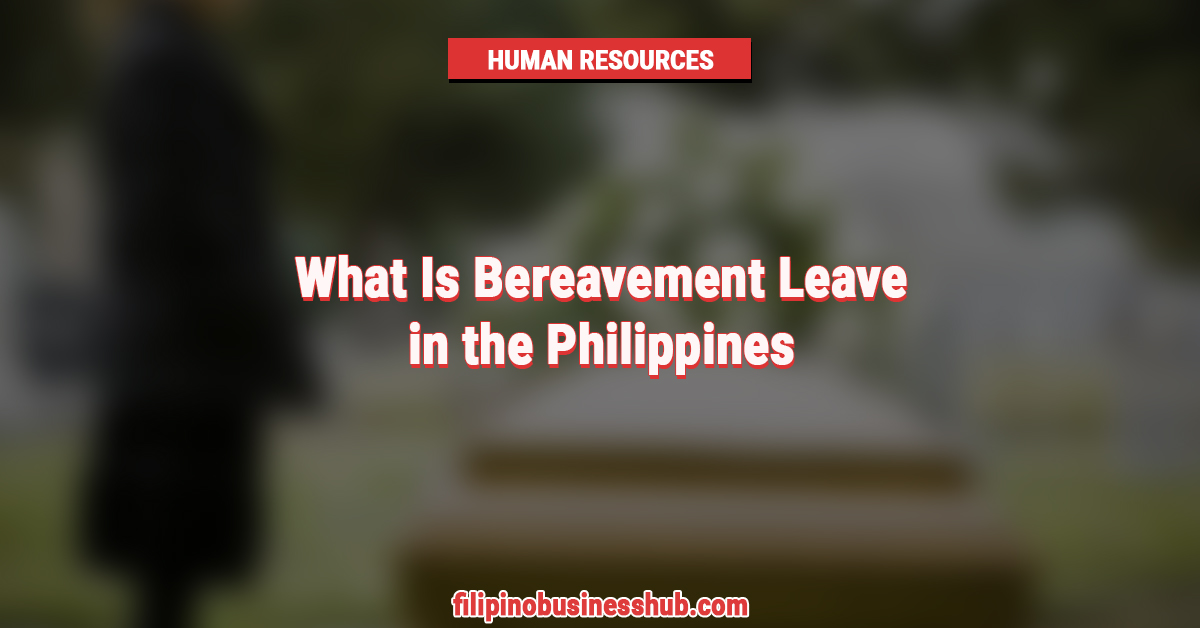What Is Bereavement Leave in the Philippines
Losing a loved one is an emotionally challenging experience that necessitates time and support for grieving individuals. In the Philippines, the provision of bereavement leave remains an evolving matter. This article aims to shed light on the current status of bereavement leave in the country, highlighting the absence of an enabling law and the reliance on company practices or collective bargaining agreements.
Table of Contents
What is Bereavement Leave in the Philippines
Bereavement leave, also known as funeral leave or compassionate leave, refers to a specific type of leave granted to employees who have experienced the loss of a loved one, typically a family member or someone with whom they had a close relationship. It provides employees with time off from work to attend funeral services, make necessary arrangements, and cope with the emotional impact of the loss.
Does the Law Require Employers to Provide Bereavement Leave in the Philippines?
No specific law in the Philippines mandates employers to provide bereavement leave. The labor code in the country only provides for a 5-day Service Incentive Leave, which can be used for any purpose chosen by the employee.
Without a dedicated law, the provision of bereavement leave in the Philippines is typically left to the discretion of employers. Some companies voluntarily include bereavement leave as part of their employee benefits, recognizing the importance of supporting their workforce during times of grief. However, the availability, duration, and eligibility criteria for bereavement leave may vary among employers, and it is not universally mandated by law.
When Can I Use Bereavement Leave if My Employer Offers It?
If your employer offers bereavement leave as part of their employee benefits, it is typically granted to employees when they experience the loss of a loved one. The specific criteria and conditions for using bereavement leave may vary among employers, so it is important to consult your company’s policies or speak with your HR department for clarification.
Generally, bereavement leave is intended to provide employees with time off to attend funeral services, make necessary arrangements, and cope with the emotional impact of the loss. It is typically used in situations where an immediate family member, such as a spouse, child, parent, sibling, or grandparent, has passed away. However, the specific definition of “immediate family” may vary depending on the employer’s policy.
In some cases, bereavement leave may also apply to individuals who have lost close friends or relatives outside the immediate family. Again, the eligibility and duration of bereavement leave will depend on your employer’s policy.
To ensure you fully understand the provisions of bereavement leave offered by your employer, it is recommended to review your company’s employee handbook and policies or consult with your HR department for specific guidelines and any documentation or notification requirements that may be necessary when using bereavement leave.
Is Bereavement Leave in the Philippines Paid?
Since there is no specific law in the Philippines that mandates bereavement leave or stipulates whether it should be paid or unpaid, the payment for bereavement leave depends on the policies set by your employer.
Some employers may choose to provide paid bereavement leave as part of their employee benefits. In such cases, employees would receive their regular pay for the duration of the approved bereavement leave. However, other employers may offer unpaid bereavement leave, meaning that employees would not receive their normal pay during their time off.
How Long is Bereavement Leave in the Philippines?
Since no specific law governs bereavement leave in the Philippines, the length of time granted is typically determined by company policies or collective bargaining agreements.
Commonly, bereavement leave ranges from one to five days, but some employers may offer more extended periods depending on the relationship with the deceased and the circumstances surrounding the loss. The specific duration of bereavement leave will depend on your employer’s policy and may be outlined in your employee handbook or other company documentation.
How Do I Ask for Bereavement Leave in the Philippines?
When requesting bereavement leave from your employer, it is important to approach the situation with sensitivity and professionalism. Here are some steps you can follow to ask for bereavement leave:
- Review company policies: Familiarize yourself with your company’s policies regarding bereavement leave. Check your employee handbook or any relevant documentation to understand the guidelines, eligibility criteria, and specific procedures for requesting leave.
- Notify your supervisor or HR department: Inform your immediate supervisor or the HR department about the loss and your need for bereavement leave as soon as possible. If there is a designated process for requesting leave, follow that procedure.
- Provide necessary information: Communicate the details of the situation, including the relationship to the deceased and any pertinent information, such as the date and location of the funeral or memorial service. This information will help your employer assess your request and make the necessary arrangements.
- Follow any documentation requirements: Your employer may request specific documentation to support your request for bereavement leave, such as a death certificate or obituary. Be prepared to provide any requested documents on time.
- Communicate your expected absence: Inform your employer of the expected duration due to the bereavement leave. Be clear about when you plan to return to work.
- Coordinate workload and responsibilities: Discuss with your supervisor or team members how your workload and responsibilities will be managed during your absence. Offer to assist in delegating tasks or provide any necessary information to ensure a smooth transition while you are away.
- Respect confidentiality: Understand that the details of your loss should be kept confidential. However, provide the necessary information to your employer to meet their requirements for granting leave.
What if My Employer Doesn’t Offer Bereavement Leave in the Philippines?
If your employer does not offer bereavement leave as part of their policies, there are several alternative options you can explore:
- Vacation or personal leave: If your employer provides vacation or personal leave, you may consider utilizing these options to take time off for bereavement purposes. Check your company’s policies regarding using vacation or personal leave and follow the procedures for requesting and scheduling time off.
- Unpaid leave: Discuss the possibility of taking unpaid leave with your employer. While this means you won’t receive your regular pay during your absence, it allows you to take the necessary time off to attend funeral arrangements and cope with the loss.
- Flexible work arrangements: Explore the option of flexible work arrangements, such as working remotely or adjusting your work hours temporarily. This could allow you to fulfill your work responsibilities while attending to personal matters during grieving.
- Employee assistance programs (EAPs): Inquire whether your employer offers employee assistance programs that provide counseling or support services. These programs can offer guidance and resources to help you cope with grief and manage the emotional impact of your loss.
- Consult with your supervisor or HR department: Have an open and honest conversation with your supervisor or HR representative about your situation. Explain your need for time off and explore any available options or accommodations they may be able to offer, even if bereavement leave is not formally provided.
Additionally, seeking external support from grief counseling services or support groups may be beneficial during this challenging time. Remember to communicate your needs effectively and approach the situation with sensitivity and professionalism.
Also Read: Understanding the Basics: How to Compute 13th Month Pay
Conclusion
Despite the absence of a specific law mandating bereavement leave in the Philippines at the time of writing, it is important to acknowledge the significance of recognizing the needs of grieving employees. While the current labor code only provides for a 5-day Service Incentive Leave, which does not explicitly address grief, the emotional toll and practical demands of losing a loved one cannot be underestimated.
Without a formal law in place, employers are responsible for establishing compassionate policies that support employees during bereavement. Many companies in the Philippines have recognized the importance of providing bereavement leave and have voluntarily included it as part of their employee benefits. This voluntary implementation demonstrates a commitment to the well-being of their workforce and acknowledges the impact of grief on an individual’s ability to function effectively at work.
Furthermore, the Department of Labor and Employment (DOLE) has expressed support for implementing bereavement leave through legislative means. While the Senate Bill filed in 2019 did not progress further, the discussions and deliberations surrounding the bill indicate a growing awareness of the need for a formal bereavement leave policy in the country.
As discussions and advocacy efforts continue, the future is hoped to bring positive developments in bereavement leave legislation in the Philippines. A dedicated law can provide a consistent framework for employers across all industries, ensuring that employees have access to the necessary time and support to grieve and attend funeral arrangements.
In the meantime, employees need to seek out support systems within their organizations and consider alternative options such as utilizing other types of leave or seeking counseling services. By prioritizing the well-being of employees during times of loss, employers can create a compassionate and supportive work environment.
It is crucial to stay updated with the latest labor laws and regulations in the Philippines, as changes may occur that impact bereavement leave. Employees and employers should consult legal experts or relevant authorities to ensure compliance with current laws.
References:
https://legacy.senate.gov.ph/lisdata/3838034834!.pdf
https://www.foi.gov.ph/requests/aglzfmVmb2ktcGhyHgsSB0NvbnRlbnQiEURPTEUtMzQwOTI4NDkxNzUxD
https://hrmasia.com/10-day-paid-bereavement-leave-proposed-in-the-philippines/






